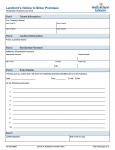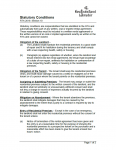Landlords can only enter a rental unit under certain circumstances. Depending on the situation the amount of notice a landlord must give the tenant is different.
Emergency Situations
In an emergency a landlord does not need to provide any notice to enter a rental unit. They can enter immediately.
To Show the Unit to a Prospective Tenant or Buyer
Sometimes a landlord may need to enter a rental unit to show it to a prospective tenant if the current tenants will be moving out. If a property is being sold the landlord may need to enter to allow the prospective buyer an opportunity to see the property.
If a termination notice has been served by either the landlord or the tenant, the landlord only needs to make a “reasonable effort” to give the tenant at least four hours notice if the purpose of the entry is to show the unit to a prospective tenant or buyer. In this case, notice does NOT need to be in writing.
If a termination notice has been served, but the purpose of entry is NOT to show the unit to a prospective tenant or buyer, the landlord needs to provide twenty-four hours written notice. The landlord must enter at a reasonable time, and the time of entry must be included on the written notice.
If a termination notice has NOT been served by either the landlord or the tenant the landlord would need to provide twenty-four hours written notice to enter, even if the purpose of entry is to show the unit to a prospective buyer. The landlord must enter at a reasonable time, and the time of entry must be included on the written notice.
If the Rental Unit Has Been Abandoned
If a landlord believes a rental unit has been abandoned, they can enter the unit with twenty-four hours written notice. When a rental unit has been abandoned there are some additional rules that apply, so we’ve created a Help Topic to cover this specific issue called Abandonment of Rental Unit.
It is important to note that a rental unit cannot be considered abandoned unless the tenant has vacated, rent is overdue, and the rental agreement has not been terminated in accordance with the Residential Tenancies Act.
With Permission from the Tenant
A landlord is permitted to enter a rental unit at any time if they have permission from the tenant prior to entering the rental unit. Permission to enter from a tenant does not need to be in writing.
All Other Cases
In all other cases a landlord is required to give a tenant twenty-four hours written notice prior to entering the rental unit. The landlord must enter at a reasonable time, and the time of entry must be included on the written notice.
If a landlord enters a rental unit without providing proper notice to the tenant, the tenant may be justified in terminating their rental agreement early under the Peaceful Enjoyment clause of the Residential Tenancies Act.
If a notice of entry is properly served a tenant should not interfere with the landlord’s right to enter. Doing so could be grounds for the landlord to serve a termination notice for interfering with their peaceful enjoyment of the rental property.
More information can be found in our Help Topic called Peaceful Enjoyment & Reasonable Privacy.



